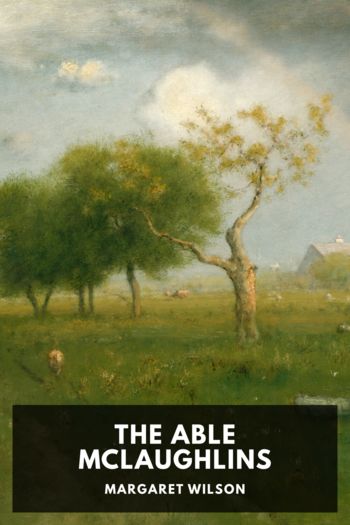The Able McLaughlins by Margaret Wilson (small books to read .TXT) 📕

- Author: Margaret Wilson
Book online «The Able McLaughlins by Margaret Wilson (small books to read .TXT) 📕». Author Margaret Wilson
Their wheat called them, at length. It was almost their year’s income, and to its whitening invitation they must listen. They took down their cradles, and fell upon it. Then they together went and harvested poor old Uncle Keith’s crop for him. He was no farmer at any time, and now too weakened by sorrow to save his wheat. Libby kept her bed for days together, and for many days Isobel McLaughlin hung over her, trying to save her sanity.
However much Chirstie shrank from it, she had to leave her mother-in-law’s well-filled house and go back to the loneliness of her own. Her harvesters must have food cooked and ready for them. Sometimes one of Wully’s little sisters stayed a few days with her, sometimes a little brother. Wully had told his mother simply that since the day Chirstie had fainted there alone on the Fourth of July, he wouldn’t have her left without company. His mother had listened simply, searchingly, wondering unhappily about many suggestive circumstances.
And all the time Chirstie kept insisting she wasn’t afraid. Not she! No indeed! But she never got Wully to believe her. He knew why she brought lunches so often to the field, and why she loitered about with him, forgetting her housework. He saw why she had suddenly become so keen about shooting, why day by day she potted away at worthless small birds, which formerly her pity would never have let her shoot. Let her say what she would, she was so much afraid that her very eyes had changed. Never before had they had that way of shifting instantly under her long lashes. Never before since she had been his wife had they had that haunted expression. She was bitterly afraid, and he was unable to reassure her. He could do nothing. It was as if some invisible unconquerable rattler crawled about in that little house where his wife and baby had been so happy. It seemed that all his safety lay in crushing down a great, uplifted club upon an intangible enemy.
The green months passed at length, and the golden ones were all but gone. John went back to Chicago, and the young children started back to school through goldenrod and wild sunflowers, down paths with fuchsia-colored wild asters, amethyst, blue, and pink. Chirstie was alone, perforce. Occasionally she had a visitor. Aunt Libby came oftener than anyone else. She was better again, able to spend day after day on horseback, going about from neighbor to neighbor, and calling, as she went, to ease her heart in the lonely places, “Lammie, Lammie!” She came often to Wully’s to see Bonnie Wee Johnnie. She had taken a notion that he was like her Peter. He ran about now, and it seemed not strange to his mother that a woman should ride miles for the pleasure of watching him. She taught him carefully to tolerate Aunt Libby’s extravagant caresses. Wully’s sisters were entirely indignant when they heard that Aunt Libby thought the baby looked like her son. But as they afterwards remarked, it was just like Aunt Libby to say that the prettiest child in the neighborhood resembled her blessed Peter.
XIXThe year’s calendar of color was almost at an end; only white was left for it now. The fields had been black. They had grown green, shyly, softly. They had given themselves up to bold greenness. They had achieved their golden maturity. They had reveled in gold, and dazzled by it. They had faded into dullness and browns. They died and lay withered. Snows would come soon for their burial. The morning’s white frosts were the promise of it.
Chirstie must keep the doors shut now, for the baby’s sake. With doors shut the house seemed a trap, a trap from whose windows she had often to be looking to reassure herself. Out of doors she felt safer, freer. So she said that the baby must have more air, and she took him day after day to the field where Wully was husking corn. Since the mosquitoes were no longer hungry, the baby’s face was free for the first time in months from red blotches. He grew rosier and rosier in the cornfield. He looked so blooming that Chirstie said she just had to take him visiting, to show him to the neighbors. That was another excuse for not staying at home alone, another which Wully pretended to be deceived by.
It happened that one morning Squire McLaughlin, riding past, saw a flock of wild turkeys alight in her dooryard, and leaving his horse, he crept toward the house, to borrow Wully’s gun, and bring down a bird for dinner. He had all but gained the house, when out of the door shot Chirstie, crying out a cry unintelligible. Out of the door and down towards the corn she flew. It gave him a startle, as he said afterwards. He didn’t know what terrible thing might have happened. He started after her. He called to her questioningly. She never lessened her pace. He said later that he had never seen a woman run as fast as she did. He could scarcely keep within sight of her among the dead cornstalks. He happened to see Wully hear her cry of anguish, and his swift, leaping answer. The Squire called to him, and Wully heard him, and stopped, confusedly, and began calling to his wife.
“It’s Uncle Wully, Chirstie! It’s only Uncle Wully!” he called to her, as if he had some great news to give her. She stumbled against him, panting and white, and the Squire hurried on to them, in consternation. There the three





Comments (0)